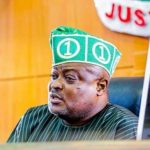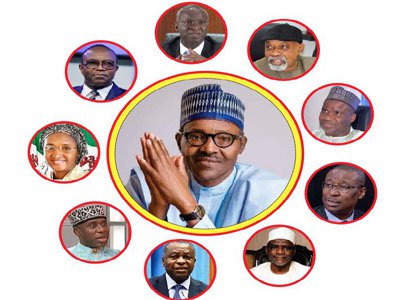
As President Muhammadu Buhari holds a valedictory session with his cabinet on May 22, the fate of outgoing ministers is shaky because it is almost certain that new blood will be injected into the system. In this piece, Yusuf Alli, Managing Editor, Northern Operation, with Nduka Chiejina, Tony Akowe, John Ofikhenua, Franca Ochigbo, Frank Ikpefan, Faith Yahaya, Grace Obike examine the performance of the ministers, highlighting those with a chance of getting into the second term cabinet.
In the next few days, the Federal Executive Council (FEC) will be dissolved, leaving ministers to move into another phase of life where the sirens will no longer wail, phones will ring less often and the retinue of aides will desert them. For almost four years, these ministers managed the government machinery with President Muhammadu Buhari.
It has, however, been a tale of mixed fortunes because not all those who started the race with the president could complete it due to exigencies. While ex-Minister Minister of State for Labour and Productivity, Mr. James Ocholi (SAN) died in a car crash alongside his wife and son, the immediate past Minister of Finance, Mrs. Kemi Adeosun was consumed by the scandal surrounding forgery of her National Youth Service Corps Scheme (NYSC) discharge certificate and Aisha Al-Hassan, (Women Affairs and Social Development) hastily resigned from office to pursue her gubernatorial ambition.
A few others moved up the ladder – among them Amina Mohammed (Minister for Environment) who bagged the post of the Deputy Secretary-General of the United Nations; Dr. Kayode Fayemi, (Solid Minerals Development,) who is now the governor of Ekiti State; Khadija Abba-Ibrahim, (Minister of State for Foreign Affairs) returned to her first love (politics) and got elected as a member of the House of Representatives; and Ibrahim Jibril (Minister of State for Environment) earned a royal call when he was chosen as the Emir of Nasarawa.
Although Kemi Adeosun’s forgery case was a sore point for Buhari’s government, the top notch appointments secured by some ministers pointed to the fact that it was not a cabinet of deadwoods after all. What cast doubts about the team was the six-month delay in assembling them. The delay in their selection also exerted much pressure on the outgoing ministers to the extent that many of them could not find their feet early enough.
Despite complaints about Buhari’s tight fiscal policies, about 15 ministers out of 30 left in the cabinet have been implicated in intense lobbying to return to the cabinet. It was gathered that most of them have become latter-day converts the president’s style of shrewdness, accountability and transparency.
A source said: “About 15 ministers have been agitating for a second chance because some of them who faltered in office are claiming that they have learnt their lessons.
“All these ministerial aspirants have been mounting pressure on the members of the president’s kitchen cabinet in order to be picked.”
But the stark reality is that not all will move to the ‘Next Level’ with Buhari. Factors which will determine their level are performance in office, political leverage, security reports on their conduct, and the president’s personal evaluation of them.
Zainab Ahmed: In the shadow of Kemi Adeosun
Since the inauguration of President Muhammadu Buhari’s administration on May 29, 2015, the Federal Ministry of Finance has had two ministers. The first was Kemi Adeosun who focused her attention on the initiation, development and aggressive implementation of innovative fiscal operations, management policies and initiatives aimed at redressing the economic fortunes of the country. The other minister is Zainab Ahmed, who is still learning the ropes. So far, she has demonstrated lack of innovation and a weak grasp of what is expected of the ministry. Her natural terrain is the extractive sector where she is highly respected.
Under Adeosun, the following initiatives were introduced: Family Homes Fund; Whistle-blower Policy; Efficiency Unit; Voluntary Assets and Income Declaration Scheme; Road Trust Fund; Development Bank of Nigeria; Asset Tracking and Management Project; Fiscal Sustainability Plans and Budget Support Facility for States; Genuine implementation of Treasury Single Accounts and hitherto hidden government monies; Clearing of inherited pension arrears and the Presidential Initiative on Continuous Audit (PICA). That is a rate of 3.27 initiatives every month while she was in office. Her successor has spent eight months and has not initiated anything new to her name but has piggy-backed on the ideas of those before her.
As a way of encouraging public participation in the fight against corruption, Kemi Adeosun championed the introduction of the landmark Whistle-blower policy, designed to support the fight against graft by exposing financial crimes and rewarding credible informants of such malfeasance.
The Federal Government on June 29, 2017 launched a revolutionary and bold reform initiative – the Voluntary Assets and Income Declaration Scheme (VAIDS), through which citizens (tax payers) are offered a window of opportunity to regularize their tax status relating to previous tax periods, without incurring penalties. This implementation of this tax initiative, also championed by Adeosun, resulted in an increase in the number of tax payers from 10 million before the assumption of office by the incumbent Administration to 14 million in 2016 and 19.3 million in 2018.
It is instructive to note that some local and foreign companies are now disposed to the VAIDS initiative, and have started to regularize their tax status.
Under Adeosun, the government settled outstanding pension arrears up to March, 2017. The sum of 41.5 billion was released by the Federal Ministry of Finance to pay off outstanding pensions arrears of 2014, 2015 and 2016, while the sum of N12.5 billion was paid out to clear pension claims for up to March, 2017, bringing the total payment of outstanding pension arrears by the current administration to over N54 billion – an unprecedented feat, which has been commended by the various workers’ unions.
When Ahmed came on board, the staff of defunct Nigeria Airways got a reprieve and have been coming to the ministry to conduct verification exercises to enable them get paid their entitlements.
On Thursday she said government has worked out financial implications of the new national minimum wage, by the presidential committee that was set up and they have submitted their report to the president and the president directed the report to the appropriate quarters.
However, as Finance Minister she never expressed an opinion on the likely fallout or effect on the economy if an additional N1 trillion from a lean purse is diverted to settle wages and salaries.
She said: “We have looked at the report and what we are working on now is how we can finance the new minimum wage.” This is suggesting that government went into negotiations with labour ill-equipped with sound economic arguments either for or against the minimum wage.
At the 2016 Annual IMF/World Bank Meetings, Adeosun led the Nigerian delegation that negotiated with the World Bank Group (WBG), African Development Bank (ADB) and European Investment Bank (EIB) for the take-off loan of USD1.3 billion (N396.5 billion) for the Development Bank of Nigeria (DBN). The CBN approved the operating license of the Bank in March 2017, subject to the provision of a minimum capital requirement of N100 billion and other conditions, which have since been satisfied.
On the other hand, Zainab Ahmed has been to the same global meeting twice and her impact has never been felt. The DBN is to provide loans to all sectors of the economy, including, manufacturing, services and other industries not currently served by existing development banks, thereby filling an important gap in the provision of finance to Micro, Small and Medium Enterprises (MSMEs). As a wholesale bank, the DBN lends wholesale to microfinance banks, which in turn on-lend medium to long-term loans to MSMEs. Already, the DBN has a N5 billion line of credit to be accessed by MSMEs through its partner institutions.
Nigeria’s total debt package now stands at N24.3 trillion. During Adeosun’s tenure, the Debt Management Office (DMO) commenced the bold initiative of refinancing high cost short-term domestic debt with relatively cheaper and longer tenured external debt, as part of its overall Debt Management Strategy of progressively achieving an optimal debt portfolio composition of 60:40 for Domestic and External debt respectively. Thus far, Nigeria has refinanced costly and short-tenured domestic bonds with over USD3 billion longer-tenored Eurobonds. The implementation of the debt refinancing strategy process has already led to a reduction in the cost of domestic borrowing, which has also reduced the cost of the country’s debt portfolio. In addition, it is also expected that lower domestic rates will benefit corporate borrowers in accessing domestic capital from the banks.
To Zainab Ahmed, her position is that Nigeria’s ballooning debt profile was a deliberate initiative on the part of government to get the country out of recession. Her defence of the huge national debt has not convinced Nigerians that the government knows what it is doing to curtail a galloping debt burden that will be passed on to the future generation.
Budget contribution figures in her tenure indicated that service wide votes was removed from her ministry completely and domiciled in Budget and National planning making ministry of finance a mere cashier of government funds rather than an effective and efficient manager of the nation’s finances .In 2018 our budgeted revenue was N7.2 trillion . This is against the realized figure of N3.96 trillion, signifying a negative variance of 45%. Despite this shortfall we have been able to fully pay salaries & service 100% of our debt. We have also released seven months overhead for 2018, two months for 2019, and N2.079trillion capital expenditure as at 14th May 2019.
The Buhari administration has promised to take Nigeria to the “next level” in the next four years. If truly it wants to make a lasting impression on the economy, the administration has to drop all weak links in its economic agenda. After the elections comes the serious business of running the country, the government needs a finance minister that is proactive and one that can take bold new fiscal decisions to set the country on solid economic ground not one that will pushed and pulled in all directions.
Having enjoyed her brief tenure as the nation’s exchequer, Zainab Ahmed wants to come back. A major push for her retention is coming from some northern governors. It is uncertain if Buhari will allow them to make input into this critical appointment.
Emmanuel Ibe Kachikwu: Reformer who got a second chance
The Minister of State, Petroleum Resources, Dr. Emmanuel Ibe Kachikwu came in with much credibility into the government having risen to the peak in Mobil Oil.
Several times he had attempted to be a minister under ex-President Goodluck Jonathan but his “integrity” is antithetical to the corrupt practices that dotted the petroleum sector during that ill-fated administration.
An egghead, the minister, who started as the Group Managing Director of the Nigerian National Petroleum Corporation (NNPC), is one of the reformers in Buhari’s cabinet. His achievements in office inspire confidence despite the fact that he ran into troubled waters with some of his pronouncements.
The greatest of his landmarks was the renegotiation of the Joint Ventures Cash Calls (JCC) exit from which the Federal Government has paid $1.5billion out of the over $5billion arrears. The measure has boosted the international oil companies’ investment confidence in the Nigerian oil and gas sector.
To address corruption in the system, he introduced the Direct Sale and Direct Purchase (DSDP) scheme in exchange of crude oil for petroleum products from the refiners. The measure which he used to replace the previous Offshore Processing Agreement (OPA) has saved Nigeria over $2.2billion since its introduction in 2016.
Under his watch, the sector was able to bring the menacing militant groups in the Niger Delta under control with the high level decision such as the relocation of the head offices of the IOCs from Lagos to the Niger Delta. The same measure also culminated in the quenching of the unending protest over the Ogoniland clean-up with the announcement and subsequent implementation of the UNEP blueprint on the region.
Prior to his assumption of office, the nation was always notorious for incessant fuel scarcity as a result of the Petroleum Support Scheme that was milking over N1.3trillion from the nation’s coffer annually with little or no product to show for it. Kachikwu, however, introduced the price modulation formula that absolved the fuel queues overnight.
Although the price of the Premium Motor Spirit was to rise from about N97 per litre to a maximum band of N145, the petrol stations are constantly wet with product. Besides, the Nigerian National Petroleum Corporation has successfully remained the lone importer of petrol as private importers have shirked their responsibility owing to the escalating forex challenges. Although analysts have criticized the resultant under- recovery measure that they depict as a return to petrol subsidy, Nigeria has not run out of product under Kachikwu’s watch which has reduced product diversion to adjoining countries.
The volume of oil production has also increased from less than 1.86million barrel per day in 2016 to 2.019million barrels per day in last year. The sector has succeeded in reducing the contracting circle of upstream operation from 24 months to nine months. This sector has reduced gas flare by 75 per cent as a result of the introduction of commercial gas utilization.
During his tenure, Nigeria flagged-off the construction of the first modular refinery by (Azikel Petroleum Ltd) in Bayelsa State. Besides, two others commenced their modular refineries construction.
His intellectual and private sector background, inability to understand the politics of being in power and sheer inexperience in cabinet intrigues, caused him to run into stormy weather along the line. His spat with NNPC GMD, Maikanti Baru, over alleged $25billion curious contracts was a sore point.
As a sitting minister, he blew the whistle on the $25billion contracts to the embarrassment of the government in which he served. The projects were as follows: Crude Term Contracts – value at over $10b; $5b DSDP contracts – value over $5b; AKK pipeline contract – approximately $3b; various financing allocation funding contracts with the NOCs – value over $3bn; and various NPDC production service contracts – value at over $3bn – $4b.
In other climes, with no law violated by the NNPC and Baru, the minister would have been fired or voluntarily resigned because his memo impugned the probity agenda of Buhari. But the President saw the crisis as a product of the rivalry between Kachikwu and Baru and gave the minister a second chance.
Left to Kachikwu, he wants to remain in the cabinet but his albatross remains the memo which breached cabinet ethics. While some forces in the kitchen cabinet do not want his sin forgiven, the IOCs and major oil producing countries are pushing for his retention. A few others are recommending a hybrid appointment of serving as a Special Adviser on Petroleum Resources with a powerful mandate. It is left to Buhari to decide.
Okechukwu Enelamah: Initiatives still at gestational stage
The mandate of the Ministry of Industry, Trade and Investment is creating an enabling business environment for businesses to thrive; implementing the Nigerian Industrial Revolution Plan (NIRP); attracting long-term local and foreign investment; encouraging expansion of MSMEs; and promotion of global and regional value chains that enhance trade.
Except for the sudden introduction of TraderMoni and MarketMoni through one of its agencies, the Bank of Industry, the tenure of the Minister of Industry, Trade and Investment, Dr. Okechukwu Enelamah would have gone unnoticed because most of his laudable initiatives are still at gestational stages.
But TraderMoni and MarketMoni were populist and they attracted overwhelming appeal at the grassroots and the main opposition Peoples Democratic Party (PDP) became jittery and branded them as vote buying initiatives in the run-up to the recent general elections.
The four years of Enelamah has seen a lot of imbalance between Nigeria and its major trading countries. Data from the National Bureau of Statistics confirmed that Nigeria recorded N6.83trn worth of trade deficit with China in the last four years. As at 2015-2018 Nigeria imported goods worth N7.65tn from China and exported N818.46bn worth of goods to China.
The minister created the Nigerian Office for Trade Negotiation (NOTN) thereby making the Trade Department in the ministry completely redundant. Staff in the department complained that the action of the minister has killed the department and rendered commercial trade officers redundant.
To his credit, the minister’s recorded progress on Ease of Doing Business reforms, which was also spearheaded by the Presidential Enabling Business Environment Council (PEBEC). These reforms led to a reduction of challenges encountered by SMEs and other businesses in areas such as starting a business; access to credit; paying of taxes, enforcing contracts or trading within and across borders, and investor-interest in Nigeria has increased.
Shortly after his inauguration, the Minister of Industry, Trade and Investment, Dr. Okechukwu Enelamah set out a key goal to improve Nigeria’s business environment for sustainable economic growth. Backed by Buhari’s commitment to a more conducive and attractive business environment in Nigeria, the Presidential Enabling Business Environment Council (PEBEC) was established under the chairmanship of Vice President Yemi Osinbajo. As Vice Chairman of PEBEC, the minister is actively involved in Nigeria’s ongoing efforts to achieve a sub-100 ranking by the World Bank on Ease of Doing Business.
Under his watch, the country rose 24 places from 169 to 145 in the World Bank’s 2018 Ease of Doing Business Index; its highest jump in the history of the rankings. And although Nigeria ranks 146 in the latest Doing Business rankings, the country’s Distance-to-Frontier (DTF) score, which is the absolute metric, improved from 51.52 in Doing Business 2018 to 52.89 in 2019.
One of the silent reforms of the ministry is in intellectual property, – especially issues such as trademarks and patents – areas key to ensuring an enabling environment for business. For the first time since the Trademarks Act came into force some 51 years ago, an Annual Report on Trademarks has been issued.
Total files digitised as at October 31, 2018 was 266,318: made up of 16,650 files from the Registry of Patents and Designs; and 249,668 files from the Registry of Trademarks.
To accelerate industrial development, the ministry, which has embarked on an aggressive implementation of the Nigeria Industrial Revolution Plan, initiated the establishment of the Nigeria Industrial Policy and Competitiveness Advisory Council aimed at increasing the contribution of the manufacturing sector to GDP by 250 per cent over a five-year period, and establish Nigeria as the manufacturing hub for West Africa, by implementing initiatives aimed at accelerating industrialization, leveraging private sector expertise and capital.
The Council has made many high-level interventions to address industrial sector issues such as electricity supply, broadband penetration and access roads. A recent example is the Road Infrastructure Development and Refurbishment Investment Tax Credit Scheme, under which the private sector has committed to sponsoring the construction or rehabilitation of road projects across the country.
Acknowledging the major role of Small and Medium-Scale Enterprises in industrial and economic development, the Ministry made noticeable improvement in access to finance for this category of investors.
Numbering over 77 million, MSMEs contribute almost half of Nigeria’s GDP and employ over 60 million people.
In the last four years, there have been sustained efforts to build capacity, increase access to finance and eliminate bottlenecks to conducting business in Nigeria. Some of the achievements in support of MSMES include the inauguration of the National Council on Micro Small & Medium Enterprises (NCMES) for more focus on MSMES. The Bank of Industry, which is an agency of the Ministry, provides relatively low-interest rate and innovative financing solutions as incentives towards stimulating interest and growth of entrepreneurship.
The bank’s disbursements are to 11 sectors, including food processing, agro- processing, healthcare and petrochemicals, solid minerals, N-Power, the creative industry and gender business amongst others.
Between January 2015 and October 2018, the bank disbursed a total of N487.5 billion to 3,334 large, medium and small enterprises.
The ₦112billion Government Enterprise and Empowerment Programme (GEEP) fund, which is part of the ₦500billion National Social Investment Programme, is aimed at providing microcredit facilities to market women, traders, artisans, farmers and agricultural workers at zero per cent interest rate. GEEP is estimated to reach 1million beneficiaries annually. So far about ₦37.72 billion has been disbursed to 1,266 enterprises.
The Bank introduced the TraderMoni product for micro-businesses across value chain clusters – motorcycle riders, food vendors and petty traders. The fund has eased access to suitable finance by these categories of businesses which in turn will enable them to grow their businesses.
It also initiated MarketMoni to provide financial aid for the under-banked and unbanked. This objective is being achieved by providing easy and quick loans at no interest rate.
Under the GEM project, a total of NGN 3.7b (USD $12.2m) has been disbursed to 910 grantees via the grant windows, while over 21,191 MSMEs have received technical assistance.
Recent achievements include the attraction of US$73.08 billion proposed investments for 65 projects in 18 states and the FCT; and the signing of MoUs with United Kingdom, Germany, and China for investment commitments totalling several billions of dollars.
To accelerate the Nigeria Industrial Revolution Plan, a project to develop world-class Special Economic Zones to position Nigeria as the pre-eminent manufacturing hub in sub-Saharan Africa, and a major exporter of made in Nigeria goods and services regionally and globally, was initiated.
Called Project MINE, (Made in Nigeria for Exports), it is to aid structural transformation of the Nigerian economy by increasing the manufacturing sector’s contribution to GDP to 20 per cent by 2025; contribute to sustainable inclusive growth by creating 1.5 million new direct manufacturing jobs in the initial phase; and to increase and diversify non-oil foreign exchange earnings to at least US$30bn annually by 2025, by increasing manufacturing sector exports.
But Enelamah’s Achilles Heel was the recent uncovering of the inclusion of illegal financing of a privately owned company with N42 billion in the 2019 Budget proposal submitted for consideration to the National Assembly.
The vote was under an item tagged Nigeria Special Economic Zone Company. Although Enelamah was able to explain that it was the government’s contribution to a partnership project, his argument swayed some and left others cold.
Chris Ngige: New minimum wage as landmark
The Ministry and Labour and Employment is no doubt one of the most difficult ministries to manage in view of its strategic roles in fostering industrial harmony in the country. Incessant strike action occasioned by agitation from workers as a result of failure of employers, especially the government to keep its own side of collective bargaining has often given the ministry so much to deal with.
With the advent of the Buhari government, worker had much hope that things will go differently as a result of the personality of the President and his change agenda. But the question is: Can workers beat their chest and say they are satisfied with the performance of the ministry?
The first step taken when the minister was inaugurated gave workers lots of hope. He had put in place a committee headed by his Minister of State, the late James Ocholi, to look into some of the collective bargaining agreements as well as to try to harmonize some existing labour laws. The death of Ocholi stalled the ideas.
Almost four years after, Ngige can boast of a few achievements, the major one being the new minimum wage of N30,000 for Nigerian workers and the fact that no worker in the public service has lost his job, especially getting employers in the oil and gas sector not to sack workers.
Despite the avoidable controversy that almost destroyed a rather seamless process of new minimum wage negotiation, the minister was able to lead the entire process to conclusion. This was a plus for him, even though he almost allowed the governors sway him. Workers saw him then as trying to dance to the tune of governors.
Another achievement of the minister is the fact that for the first time, Nigeria is occupying three slots on the Governing Board of the International Labour Organization with one Regular and two deputies. He has been able to convince other African Labour Ministers to concede the Regular membership representing Government on the board to Nigeria when the next election takes place in 2020.
One key institution that would have lessened the burden of the minister, which he failed to put in place, is the Labour Advisory Council. For several years, Labour has agitated for the constitution of the council which is a creation of law. But till date, members of the council have not been nominated and there is no hope in sight for the constitution of the council before the end of this tenure.
However, the failure of government to implement agreement reached with trade unions is seen a minus for him, even though he does not have direct control over such implementations. Two cases stood out during Ngige’s tenure.
First is the case of the Academic Staff Union of Universities (ASUU) and other teaching unions. The second is the crisis in the health sector which saw the government withholding salaries of union members for one and half months since April 2018. Interestingly, after entering into agreement with the workers and failed to implement same, the Minister declared a no-work, no-pay policy when the workers decided to down tools. In what appeared to be a double standard, the government did not apply the same policy to striking lecturers when they embarked on strike for almost four months.
For this, workers in the health sector see him as a minister with preference for doctors. They accused him of conniving with his health counterpart to deny them their rights. Even when the matter went to the Industrial Court who then referred it to arbitration, the government side led by the Federal Ministry of Health refused to appear for arbitration, leaving the matter pending.
The delay in the inauguration of the board of the Nigeria Social Insurance Trust Fund (NSITF) cast a lot of shadow on the Minister. However, while the minister may have acted in good faith, the delay by the Presidency in responding to the issue blew a rather simple matter it out of proportion. The government failed to respond to series of letters from organized labour on the matter, thereby putting the minister in a tight corner. The government’s response after the workers rightly or wrongly picketed his house was belated.
The refusal by the ministry to register another trade centre called the United Labour Congress is seen as a big plus for him. The ULC broke out of the Nigeria Labour Congress after its 2015 delegates’ conference and claimed to have met all legal requirements for registration as a trade body. But in accordance with the law, the minister has refused to register ULC.
In all, the Minister of Labour excelled in tackling labour crises save for the ASUU strike action which lingered unnecessarily. The fact that he has been able to give the country a positive image within the continent is a plus for him.
The hurdles against his return as a minister are include the perception that he is rigid to a fault; inability to deliver Anambra State to the APC during the last elections and some controversial comments which have spiral effects on the perception of Buhari administration.
Rotimi Amaechi: Shaping rail as Buhari administration’s defining legacy
When ex-Governor of Rivers State, Rotimi Amaechi, was appointed the Minister of Transportation, there were issues on whether or not he will be able to cope. But the minister has been one of the defining success beacons of the Buhari administration. He has not only introduced transparency into the ministry’s activities, he has been one of the few restless cabinet members with visible landmark projects. His passion for railway development has made him to embark on risky shuttles to see most projects through.
His plans for railway modernization in Nigeria could be classified into three namely completed, ongoing and upcoming projects. The completed Standard Gauge Railway Projects are the Abuja (Idu) to Kaduna and Segment 1 of Lagos to Kano standard gauge railway modernization project). The total length of the Abuja to Kaduna is 186.50KM.
The Ongoing Standard Gauge Railway Projects include the 156.5kilometre Lagos to Ibadan Double Track Standard Gauge Railway project with extension to Apapa Port Complex (Segment 1 of Lagos to Kano Standard Gauge Railway Modernization Project).
As the tenure of all cabinet members expires soon, Amaechi embarked on his last monthly inspection tour to assess the progress of work on the Lagos-Ibadan rail project. As at the last inspection track laying had reached 123kilometres. The journey that led to laying of tracks up to 123km was achieved through the tireless effort of the minister.
For those who were part of the process, the minister embarked on over 22 inspections to achieve the level of work. Those who were on the monthly trips drove through bushes, dusty paths and forest day and night.
As part of his achievements, the Federal Government, it was learnt, is on the verge of possible signing of the co-financing loan agreement to kick off the project of the outstanding portion of Lagos-Kano rail line (Ibadan-Abuja and Kaduna-Kano approximately 1000km).
The prioritized upcoming railway projects include Lagos to Calabar Coastal Railway Line with branch line from Benin City to Onitsha (1431.5Km); Kano to Dayi to Kastina to Maradi (354km), and Railway Industrial Park in Port Harcourt D. Port Harcourt to Maiduguri Standard Gauge Railway Line (2,058.838Km).
The main features for the Port Harcourt- Maiduguri are -Port Harcourt – Enugu -Akwanga – Gombe – Maiduguri (1305.638Km), Bonny -Port Harcourt (67.0Km); Port Harcourt to Owerri to Awka to Enugu (266.0Km); Enugu to Abakaliki (61.4Km); Akwanga to Abuja (142.0Km); Gombe to Yola and Gombe to Jalingo (216.8Km).
The government explained that the reasons for prioritizing the Coastal, Port Harcourt to Maiduguri and Kano to Maradi Rail Line was because the proposed three rail lines are amongst the key railway corridors in the 25 Year Strategic Vision Plan of the Nigerian Railway development.
The proposed railway project when completed will connect 11 states – Lagos, Ogun, Ondo, Edo, Anambra, Delta, Bayelsa, Rivers, Abia, Akwa Ibom, and Cross River) in the southern region of the country from western flank to eastern flank of Nigeria.
It will also connect 17 states which include: Rivers, Abia, Enugu, Benue, Nassarawa, Kaduna, Plateau, Bauchi, Gombe, Yobe and Borno from the Southern to the Northern hemisphere of eastern flank of Nigeria. The branch lines will connect all the nearby states to the main line and traverse the following states: Imo, Anambra, Ebonyi, Adamawa, Taraba and FCT, Abuja while it will also connect the Kano to Jibiya in Maradi (another commercial hub of Niger Republic).
To reduce the hardship of travelers who use the train service from Kaduna to Abuja, the minister ordered that two additional coaches be deployed to the corridor from Warri-Itakpe route. In addition to this, the minister during his recent visit to China hinted that the country will take delivery of 10 coaches by June. Under his watch also, the Kaduna Inland Dry Port has commenced the cargo delivery service from the port to Lagos.
Amaechi has a unique can-do spirit and he is well-loved by the President. If merit is the order of the day, he has towered above his fellow ministers to earn a reappointment into the cabinet. His achievements in office were used as campaign talking points by Buhari during the last presidential election.
On the political front, however, it has been more of a mixed bag for the minister. Irreconcilable differences between him and certain individuals with the Rivers State chapter of the APC made the party to lose the right to participate in the general elections. It was a miscalculation by the APC family which left the President and many leaders of the party bewildered.
But that downside is countered by the fact that Amaechi successfully reprised his 2015 role as Director-General of the Buhari presidential campaign at this year’s general election. That triumph, along with his ministerial accomplishments, stands him in good stead of a return to the cabinet.
Hadi Sirika: Meeting his modest targets
The Minister of State for Aviation, Sen. Hadi Sirika had one ambition when he was appointed in 2015 to keep the nation’s airspace safe and guarantee smooth flights. He said he was not interested in building cosmetic airport terminals without safe passage for air travellers.
He has lived up to his target because airlines are more safety conscious than it used to be. For four years that he has been in charge, no single domestic airline accident was recorded.
He said: “In the areas of State Safety Programmes, Nigeria has attained Level 3 out of 4 levels, thereby moving Nigeria from red to green on the ICAO dashboard. In line with ICAO and WMO standards, in July 2017, the Nigerian Meteorological Agency acquired ISO9001 2015 certificate, which qualifies it to offer aeronautical meteorological services. The agency became the first in Africa to be so certified.”
He placed premium on Growing and Sustaining the Domestic Aviation Industry; Re-introduction of zero import duties on aircraft, engine and introduction of same for spare parts. He also floated an intervention to rescue Arik Air and Aero Contractors from total collapse. He ensured the completion of the Kano Tower Automated Air Traffic Management and Meteorological Systems, installed the Instrument Landing Systems (ILS) Category II (CAT II), Doppler VORs (DVORs), Distance Measuring Equipment (DMEs) at four airports namely Lagos, Kano, Port Harcourt and Kaduna. Those of Minna, Jos, Yola, Maiduguri, Benin and Akure are still on-going and nearing completion.
In line with his commitment to precautionary measures, Sirika on March 7, 2017 shutdown the Nnamdi Azikiwe International Airport in Abuja for the rehabilitation of its dilapidated 4,000m-plus runway for six weeks. It was a bold and courageous decision by Sirika. Also, the laws are strictly applied for the rich and the poor. Those jet owners, who have abused the system by not paying accruing parking fees, were sanctioned.
You may be interested

Boniface Scores As Leverkusen Beat Bochum, Close In On Bayern Munich
Webby - March 28, 2025Victor Boniface was on target for Bayer Leverkusen in their 3-1 home win against Bochum in the Bundesliga on Friday…
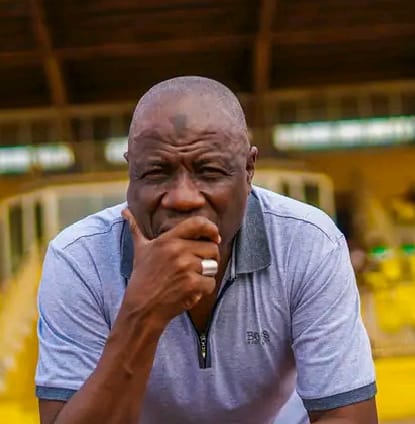
NPFL: Defeat To Kwara United Painful — Nasarawa United Boss Yusuf
Webby - March 27, 2025Nasarawa United head coach Salisu Yusuf has reacted to his team’s 1-0 loss to Kwara United, reports Completesports.com. Emeka Onyema…

Cote d’Ivoire Withdraw As Host Of U-20 AFCON
Webby - March 27, 2025Cote d’Ivoire announced late Tuesday its withdrawal from hosting the 2025 U-20 Africa Cup of Nations just weeks before the…

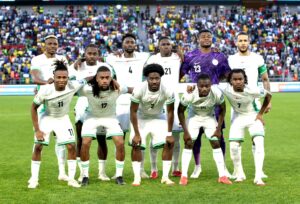












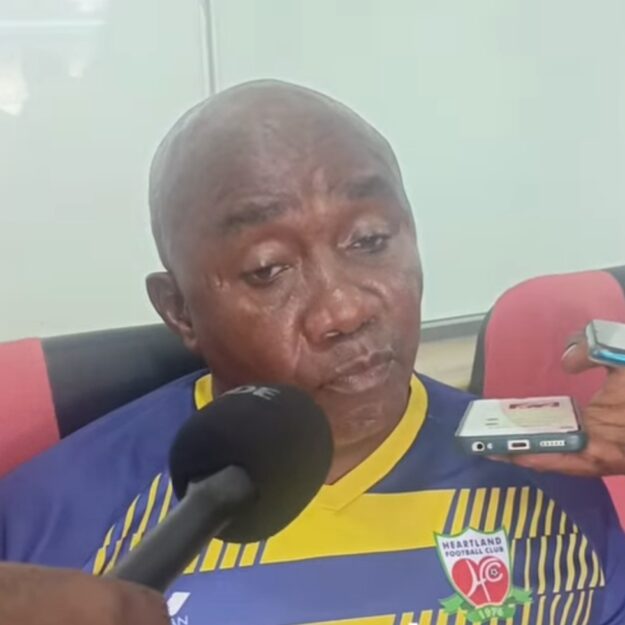

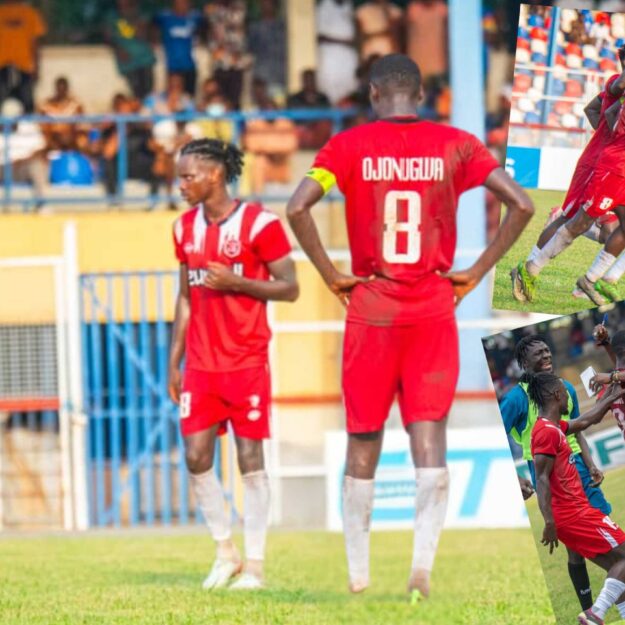
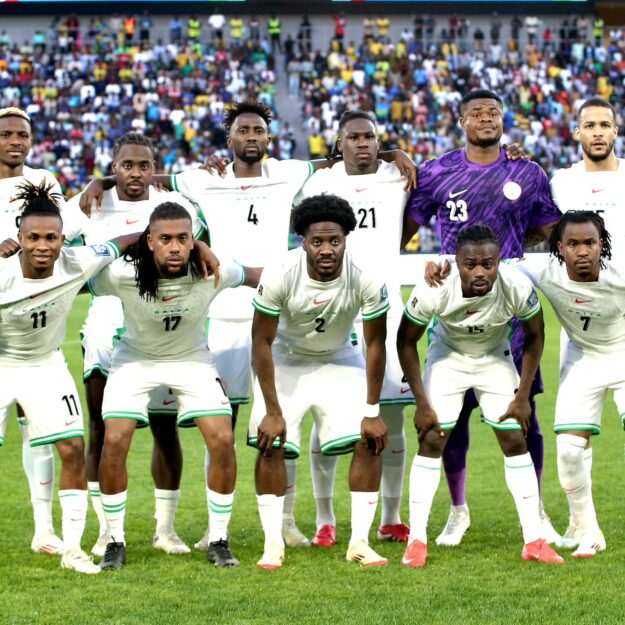


![American Pastor, David Wilson Seen Eating The Box Of Woman Who Isn’t His Wife [Video]](https://onlinenigeria.com/wp-content/uploads/2019/10/american-pastor-david-wilson-seen-eating-the-box-of-woman-who-isnt-his-wife-video-150x150.jpg)




![Burnaboy Caressing His New UK Girlfriend [VIDEO]](https://onlinenigeria.com/wp-content/uploads/2019/03/burnaboy-caressing-his-new-uk-girlfriend-video-150x150.jpg)



